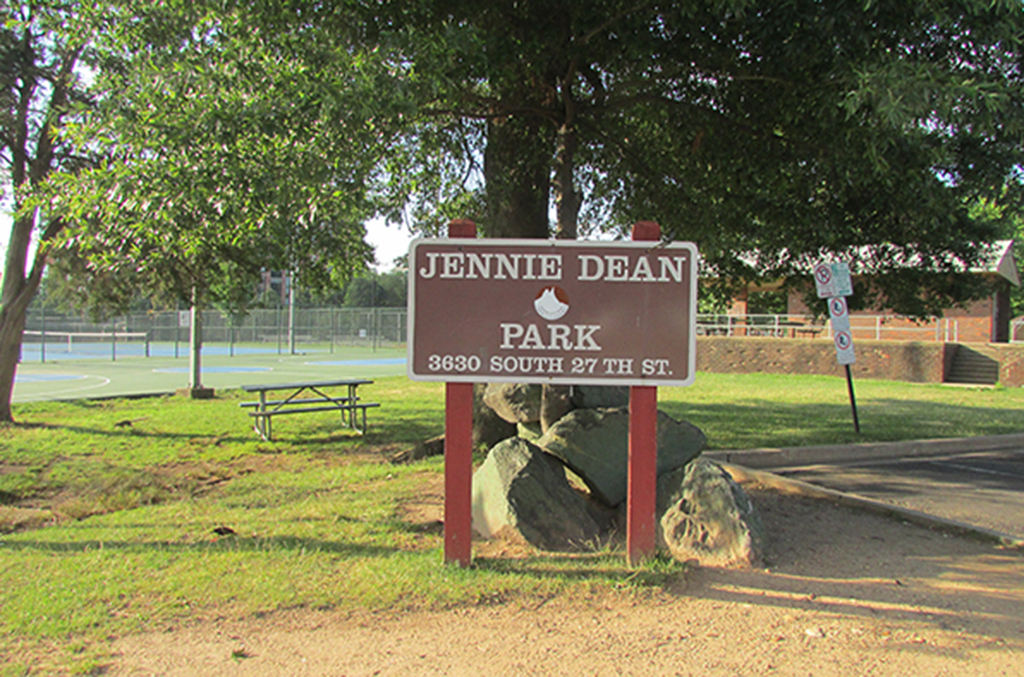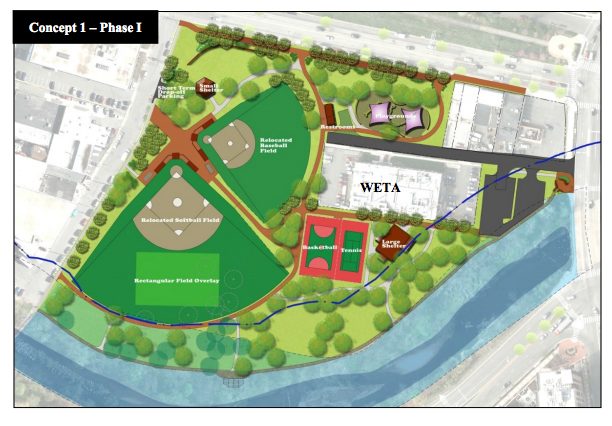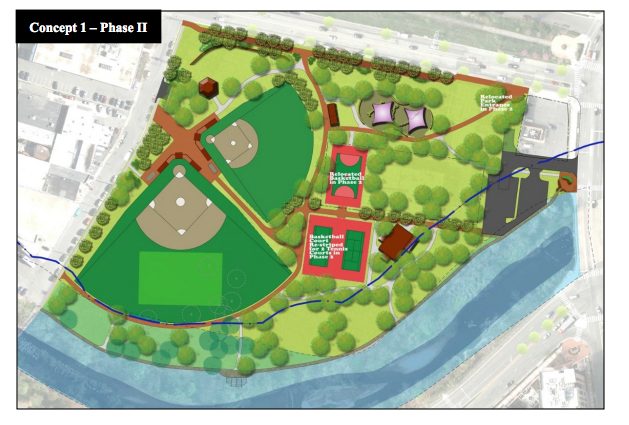As Arlington officials continue to chart out the future of the Four Mile Run valley, some community leaders in Nauck feel their concerns are being ignored by the county and are demanding a louder voice in the proceedings.
The county’s worked since 2016 to craft new planning documents for the area, primarily located in Nauck but touching Shirlington and other South Arlington neighborhoods as well, in a bid to guide the gradual transformation of the valley’s parks and business district. The County Board passed a “policy framework” to provide a roadmap for that process in May, and is set to sign off on a “parks master plan” for the area at its meeting this weekend.
But even with a slew of community meetings on the subject and a working group dedicated to the valley, some Nauck leaders remain frustrated by how the county’s handled their input. While they have gripes with some policy specifics — the re-design of Jennie Dean Park, in particular — their broader concern is that residents are being left out of the process of determining their own neighborhood’s long-term outlook.
“It is confounding when the community that’s most impacted by the Four Mile Run valley is blocked from county communication,” Robin Stombler, a Nauck resident and vice chair of the Four Mile Run working group, told ARLnow. “There’s been a history of exclusion and marginalization of this community, and the county’s current actions don’t correct that history.”
As Stombler points out, the community’s roots as a historically black neighborhood add an extra level of tension to any discussion of how the county engages with people in Nauck. Even with the Board’s frequent commitments to remedying historic inequities in the community as part of the planning process, some residents can’t help but feel suspicious that Nauck’s past is still influencing its future.
“This community has been ignored repeatedly by the Arlington County Board while the requests and desires of several other, predominantly white, Arlington neighborhoods are being placed ahead of those of the people who live here,” Nauck resident Renee Greenwell wrote in an email. “It takes a lot for a historically marginalized community to speak its mind, [and] for Arlington County leaders and staff to patronize us and ignore our opinions is despicable.”
Arlington officials dispute that they’ve ignored any community involved in the planning, let alone Nauck. For his part, Board member John Vihstadt, the Board’s liaison to the Four Mile Run working group, says he’s done his best to “understand and appreciate the sometimes varied perspectives of all stakeholders in our planning process, especially those from Nauck.”
County parks department spokeswoman Susan Kalish also touted the “enormous amount of community outreach” involved in the process, noting that the county has held a total of 65 meetings on the valley as well as creating “an online forum for those who could not attend” those gatherings.
Nauck Civic Association President Portia Clark, however, says the county’s “engagement process was lousy from the beginning.” While she says the county has indeed held plenty of meetings, it’s the quality of those meetings that concern her.
For instance, Clark says she invited parks officials to a civic association meeting last Monday (Sept. 10) to have a broader conversation about the parks master plan. Despite repeated requests, Clark and Stombler both say the county ultimately only sent one representative to the meeting, who couldn’t discuss the plan in the detail they were looking for.
“Where were the other county folks behind the parks plan?” Clark said.
Kalish acknowledges that the county was invited to that gathering, but noted that other officials had just held an “open house” on the parks plan on Sept. 5, calling it “robust and distributive.”
“We heard from a variety of people, including residents from Nauck and the surrounding communities,” Kalish said.
But Clark claims the meeting was sparsely attended, coming so soon after Labor Day, with county officials outnumbering community members by a hefty margin.
“How engaging is that?” Clark said. “We recommended from the beginning that they contact every household… It just went on deaf ears, because they weren’t listening.”
Clark feels that the county instead came into the process with “certain things in mind that they wanted,” and then refused to change based on community input.
Among her biggest concerns are the plans to revamp Jennie Dean Park. Eventually, the county envisions acquiring the WETA building next to the park, relocating a baseball field and adding new tennis courts to the area.
The Board ultimately endorsed a plan to move the field closer to the intersection of 27th Street S. and S. Nelson Street, even though Clark’s civic association and the county’s Park and Recreation Commission backed an option that would’ve left a bit more open space at the front of the park by locating the field elsewhere. But county staff endorsed the former alternative, reasoning it would be easier to build and maintain, and the Board is set to formalize that selection when it votes on the park master plan Saturday (Sept. 22).
To Clark, the dispute represents the perfect example of the county not listening to Nauck’s input, even though the neighborhood hosts the park itself.
“We’re concerned it will be a border to the community, and about the noise levels, what will project out into the neighborhood,” Clark said. “We just have to live with that now.”
Vihstadt noted that “Board members and staff are in continued communication with a variety of communities as we approach our Saturday vote,” and said the county is working to “build as much consensus and mutual understanding as possible” on the plan.
But Stombler is already looking a bit beyond the parks plan to what she thinks the county can take away from this whole dust-up moving forward.
“I think we need an assessment of how this process has proceeded, so future engagements are more collaborative and understanding of the community,” she said.




